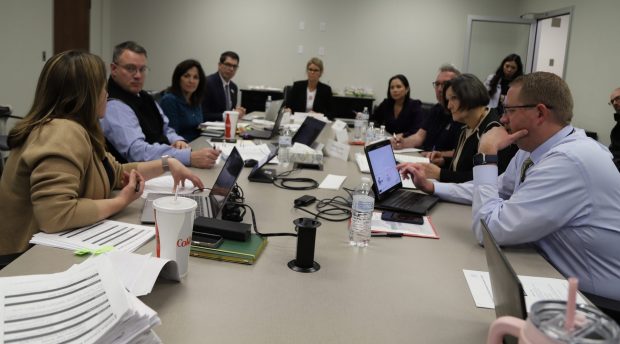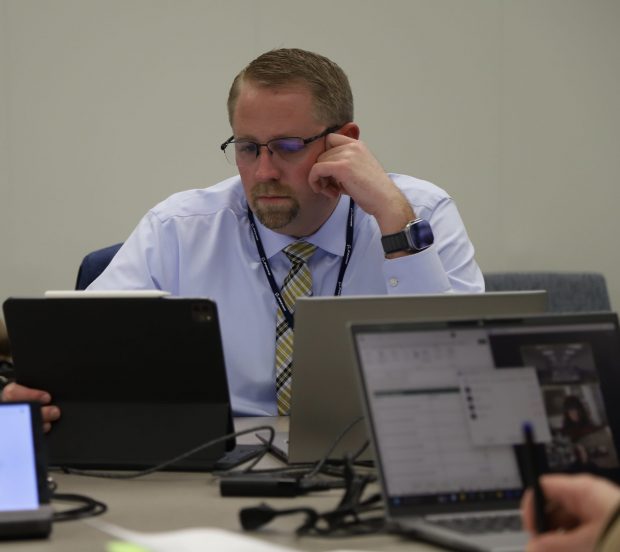
The Idaho Department of Education’s career technical education (CTE) grant program for secondary schools awarded its final $7.4 million.
There’s been a “loud demand from industry to grow local programs,” said Superintendent Debbie Critchfield.
The Idaho Career Ready Students council (ICRS) selected 23 program applications to fund new programs, existing programs and capital projects. The council has awarded over $43 million in six months to 58 proposals. The state started accepting applications last summer.
In total, 92 applications were passed over in places like Kendrick and Kamiah and Jerome. And more than $95 million in requests went unfunded.
“Demand for these grants has been significant and the council had its work cut out for it in assessing many worthwhile projects,” Critchfield said.
“We’re $100 million short,” said Sen. Kevin Cook, R-Idaho Falls, who serves on the council.

For about five hours, the group mulled over the pros and cons of 57 pending applications before settling on their 23 finalists.
Several schools sought additional equipment that was not requested in an earlier application, already approved in a previous funding round. The council was not in favor of funding these proposals.
There was also opposition to schools purchasing items that were not approved on their original applications. Switching from a laptop to a PC is okay but schools should not buy a different piece of equipment.
“Stick to what we approved,” Cook said.
And the council does not want schools to unilaterally spend surplus money, if equipment costs or larger projects come in under budget. Surplus funds are to be returned so the council can fund additional proposals.
Awarded funds should only be used or eligible expenses: capital expenditures needed to upgrade and expand existing CTE programs; capital costs associated with building programming and construction; and initial investments to develop CTE programs specific to local region and job market.
“Don’t use any of the money on any items that we haven’t allowed,” someone said.
Cook suggested a media blitz to highlight where the money is being spent. “Hopefully, we can do more of this stuff,” he said, about providing additional money to expand capacity.
The following grants were awarded to support existing programs with nearly $1 million in funding provided:
- Mountain View School District was awarded $100,709 for Grangeville High School and $89,840 for Clearwater Valley School to modernize both CTE programs to be responsive to industry needs.
- Rockland School District was awarded $49,350 to make welding program equipment upgrades at Rockland High School.
- Aberdeen School District was awarded $4,336 to upgrade greenhouse equipment at Aberdeen High School.
- Oneida County School District was awarded $40,100 to fund upgrades to auto lifts and other safety equipment at Malad High School.
- Weiser School District was awarded $84,000 to perform a multi-CTE program update and to upgrade the ag welding programs at Weiser High School.
- Bruneau Grand View School District was awarded $46,979 to make welding shop improvements at Rimrock Jr./Sr. High School.
- Wendell School District was awarded $9,889 to upgrade the ag program at Wendell High School.
- Orofino Joint School District was awarded $312,000 to perform an expansion and upgrade to the industrial maintenance mechanic program at Timberline Schools.
- Cambridge School District was awarded $45,000 to make CTE upgrades at Cambridge Middle/High School.
- Plummer-Worley School District was awarded $146,820 to make upgrades to the ag welding, ag mechanics and power systems at Lakeside High School.
The following grants were awarded for capital projects with $6.44 million in funding provided:
- Idaho Forestry & Natural Resource Collaborative was awarded $580,000 to fund a facility and equipment for the newly-formed Idaho Forest Products Education Collaborative.
- Kamiah School District was awarded $249,657 to fund the purchase of forest products facilities and equipment for Kamiah High School.
- Nezperce School District was awarded $86,235 to fund a greenhouse at Nezperce High School.
- Mackay School District was awarded $635,000 to fund an animal science and diesel repair and maintenance center at Mackay Jr./Sr. High School.
- Lapwai School District was awarded $1,278,843 to fund a shop facility at Lapwai Middle/High School.
- American Falls School District was awarded $908,775 to fund an ag building expansion at American Falls High School.
- Ririe School District was awarded $1,300,000 to build an auto and diesel mechanic shop at Ririe Jr./Sr. High School.
- Salmon River School District was awarded $114,683 to fund ag shop equipment upgrades at Salmon River Jr./Sr. High School.
- Shelley School District was awarded $98,000 to fund materials needed for the student-lead Save the Spuds project.
- Hagerman School District was awarded $884,248 to fund a food science lab at Hagerman High School.
- Cascade School District was awarded $305,000 to create a geothermal greenhouse at Cascade Jr./Sr. High School.
The following grant was awarded for the creation of a new program:
- Notus School District was awarded $67,946 to fund the expansion of the ETE program and the creation of a new cybersecurity focus at Notus Jr./Sr. High School.
“I’d like to thank every local education agency that took the time to apply and to thank the council for its diligent work to help transform CTE in Idaho,” Critchfield said.
The 11-member ICRS Council is chaired by Critchfield and is made up of a variety of members from stakeholder groups around Idaho. It is tasked with evaluating program applications received from local education agencies.
